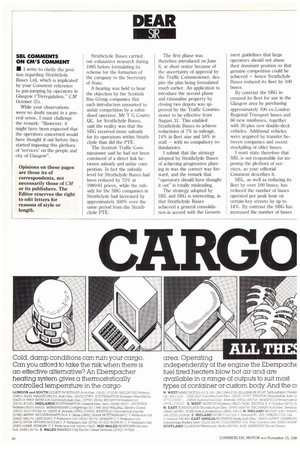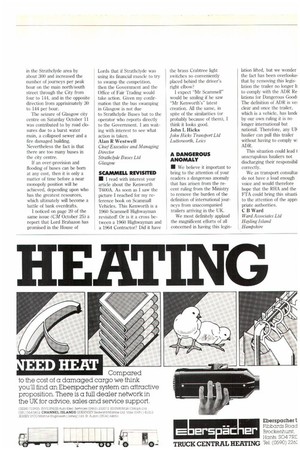SBL COMMENTS ON CM'S COMMENT • I write to clarify
Page 32

Page 33

If you've noticed an error in this article please click here to report it so we can fix it.
the position regarding Strathclyde Buses Ltd, which is implicated by your Comment reference to gun-jumping by operators in Glasgow ("Deregulation," CM October 25).
While your observations were no doubt meant in a general sense, I must challenge the remark: "However, it might have been expected that the operators concerned would have thought it out before they started imposing this plethora of 'services' on the people and city of Glasgow".
Strathclyde Buses carried out exhaustive research during 1985 before formulating its scheme for the formation of the company to the Secretary of State.
A hearing was held to hear the objection by the Scottish Bus Group companies that such introduction amounted to unfair competition by a subsidised operator. Mr I G Coutts QC, for Strathclyde Buses, • said the reality was that the SBG received more subsidy for its operations within Strathclyde than did the PTE.
The Scottish Traffic Commissioner said he had not been convinced of a direct link between subsidy and unfair competition. In fact the subsidy level for Strathclyde Buses had been reduced by 75% at 1980/81 prices, while the subsidy for the SBG companies in Strathclyde had increased by approximately 300% over the same period from the Strathclyde PTE. The first phase was therefore introduced on June 8, at short notice because of the uncertainty of approval by the Traffic Commissioner, despite the plan being formulated much earlier. An application to introduce the second phase and rationalise property by closing two depots was approved by the Traffic Commissioner to be effective from August 31, This enabled Strathclyde Buses to achieve reductions of 7% in mileage, 14% in fleet size and 16% in staff — with no compulsory redundancies.
1 submit that the strategy adopted by Strathclyde Buses of achieving progressive phasing in was the correct way forward, and the remark that "operators should have thought it out" is totally misleading.
The strategy adopted by SBL and SBG is interesting, in that Strathclyde Buses achieved a general consolidation in accord with the Govern
ment guidelines that large operators should not abuse their dominant position so that genuine competition could be achieved — hence Strathclyde Buses reduced its fleet by 100 buses.
By contrast the SBG increased its fleet for use in the Glasgow area by purchasing approximately 100 ex-London Regional Transport buses and 60 new minibuses, together with 30-plus new double-deck vehicles. Additional vehicles were acquired by transfer between companies and recent stockpiling of older buses.
I must state therefore that SBL is not responsible for imposing the plethora of services, as your editorial Comment describes it.
SBL, as well as reducing its fleet by over 100 buses, has reduced the number of buses operated per peak hour on certain key streets by up to 14%. By contrast the SBG has increased the number of buses in the Strathclyde area by about 300 and increased the number of journeys per peak hour on the main north/south street through the City from four to 144, and in the opposite direction from appriximately 30 to 144 per hour.
The seizure of Glasgow city centre on Saturday October 11 was contributed to by road closures due to a burst water main, a collapsed sewer and a fire damaged building. Nevertheless the fact is that there are too many buses in the city centre.
If an over-provision and flooding of buses can be born at any cost, then it is only a matter of time before a near monopoly position will be achieved, depending upon who has the greatest resources, which ultimately will become a battle of bank overdrafts.
I noticed on page 20 of the same issue (CM October 25) a report that Lord Brabazon has promised in the House of
Lords that if Strathclyde was using its financial muscle to try to swamp the competition, then the Government and the Office of Fair Trading would take action. Given my confirmation that the bus swamping in Glasgow is not due to Strathclyde Buses but to the operator who reports directly to the Government. I am waiting with interest to see what action is taken.
Alan R Westwell
Chief Executive and Managing Director Strathclyde Buses Ltd Glasgow






























































































